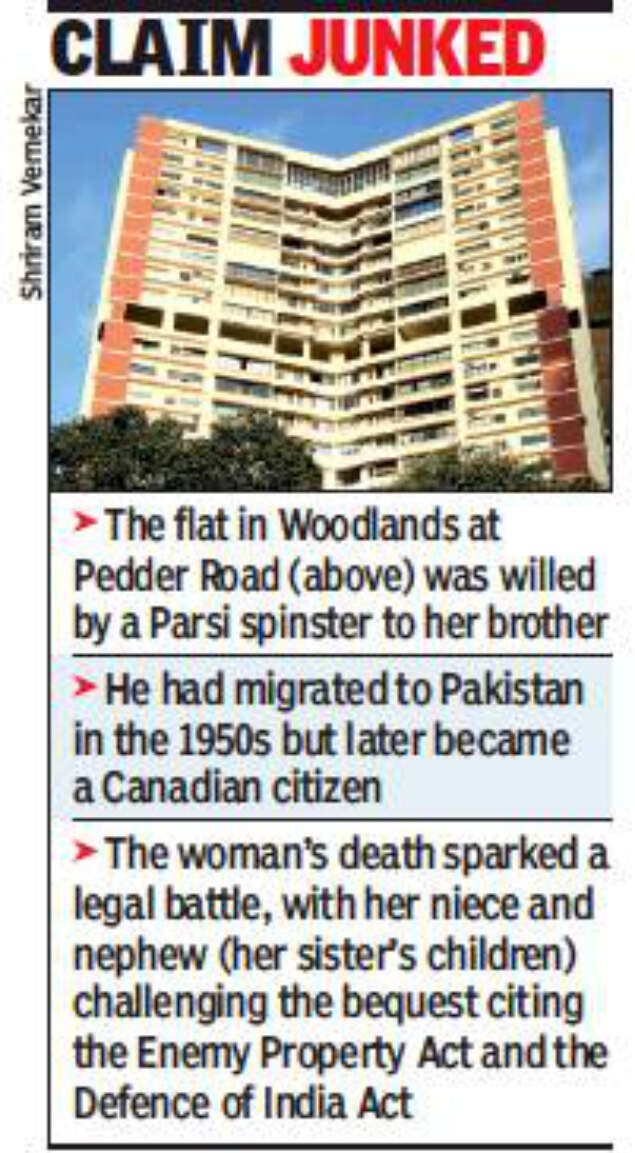
MUMBAI: A Parsi spinster, before dying last year, willed her Pedder Road flat to her brother who had migrated to Pakistan in the 1950s but later became a Canadian citizen.
The flat in the landmark building Woodlands “be sold and the money (given to him)”, said the will. But her death sparked a battle in the Bombay high court, in which the Enemy Property Act and the Defence of India Act and Rules were invoked by the will’s caveators (persons interested in a matter before a court and who seek to be heard).

The woman’s other heirs —a nephew and a niece, children of her late sister—filed a caveat when an executor of the will sought its probate (the legal process to decide genuineness and correctness of a will).
The duo challenged the bequest to their uncle as “void”, stating that under law, he is an “enemy” and not entitled to be a beneficiary under the Enemy Property Act, 1968 (which enables and regulates the appropriation of property in India owned by Pakistani nationals). The high court rejected the claim.
“(The flat is) not enemy property as of date. The property is not vesting in a custodian,” said Justice A K Menon. Hence, he said, the question whether the brother is an enemy or an enemy subject loses significance. He said the property was clearly the woman’s, who was an Indian, and hence her bequest couldn’t be challenged as void.
The flat in the landmark building Woodlands “be sold and the money (given to him)”, said the will. But her death sparked a battle in the Bombay high court, in which the Enemy Property Act and the Defence of India Act and Rules were invoked by the will’s caveators (persons interested in a matter before a court and who seek to be heard).

The woman’s other heirs —a nephew and a niece, children of her late sister—filed a caveat when an executor of the will sought its probate (the legal process to decide genuineness and correctness of a will).
The duo challenged the bequest to their uncle as “void”, stating that under law, he is an “enemy” and not entitled to be a beneficiary under the Enemy Property Act, 1968 (which enables and regulates the appropriation of property in India owned by Pakistani nationals). The high court rejected the claim.
“(The flat is) not enemy property as of date. The property is not vesting in a custodian,” said Justice A K Menon. Hence, he said, the question whether the brother is an enemy or an enemy subject loses significance. He said the property was clearly the woman’s, who was an Indian, and hence her bequest couldn’t be challenged as void.
#ElectionsWithTimes
Elections 2019

Trending Topics
LATEST VIDEOS
More from TOI
Navbharat Times
Featured Today in Travel
Quick Links
Lok Sabha Election Schedule 2019Lok Sabha Election NewsDelhi Capitals teamMI team 2019Rajasthan Royals 2019RCB team 2019Maharashtra Lok Sabha ConstituenciesBJP Candidate ListBJP List 2019 TamilnaduShiv Sena List 2019AP BJP List 2019Mamata BanerjeeBJP List 2019 MaharashtraPriyanka GandhiBJP List 2019 KarnatakaAMMK Candidate List 2019BJP List 2019 WBLok Sabha Elections in Tamil NaduBSP List 2019 UPNews in TamilLok Sabha Poll 2019Satta Matka 2018PM ModiMahagathbandhanNagpur BJP Candidate ListChandrababu NaiduTamil Nadu ElectionsUrmila MatondkarNews in TeluguMadras High CourtTejashwi YadavArvind KejriwalTejasvi SuryaPawan KalyanArvind KejriwalYogi AdityanathJaya PradaSatta King 2019Srinagar encounter
Get the app









